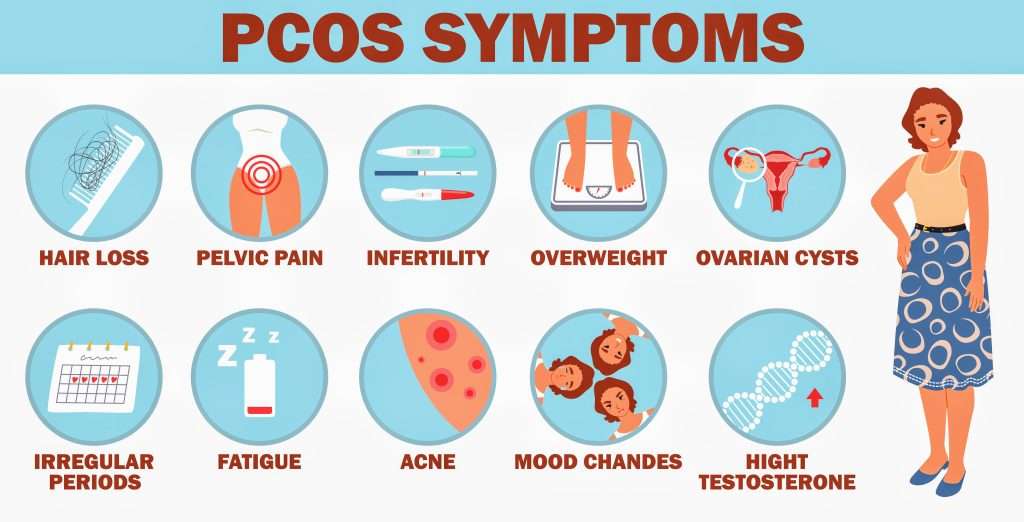What is PCOS (Polycystic Ovary Syndrome): A Detailed Overview
Polycystic Ovary Syndrome (PCOS) is a common endocrine disorder that affects individuals with ovaries, typically during their reproductive years (ages 15–44). It is one of the leading causes of infertility and is associated with various metabolic and psychological challenges. PCOS affects about 8–20% of individuals of reproductive age, though many remain undiagnosed. In this blog we will know what is pcos and it will be avoided.
Contents
Characteristics of PCOS
1. Hormonal Imbalances:
Excess Androgens: Increased levels of male hormones (androgens) such as testosterone.
Low Progesterone: Due to irregular ovulation, progesterone levels are often reduced.
Elevated LH and Insulin Resistance: Higher levels of luteinizing hormone (LH) and insulin resistance are common.
2. Menstrual Irregularities:
Oligomenorrhea (fewer than eight periods a year).
Amenorrhea (absence of periods for more than three months).
Heavy menstrual bleeding.
3. Polycystic Ovaries:
Enlarged ovaries with multiple small, fluid-filled sacs (follicles) visible on ultrasound.
Symptoms of PCOS
The symptoms can vary widely and may include:
Reproductive Symptoms:
Irregular or absent menstrual periods.Difficulty conceiving (infertility) due to lack of ovulation.
Physical Symptoms:
Excess hair growth (hirsutism), particularly on the face, chest, back, or abdomen.
Acne or oily skin.
Thinning hair or male-pattern baldness.
Metabolic Symptoms:
Weight gain, especially around the abdomen.
Difficulty losing weight.
Dark patches of skin (acanthosis nigricans), often on the neck, groin, or under breasts.
Psychological Symptoms:
Depression and anxiety.
Mood swings.
Low self-esteem or body image concerns.
What causes PCOS
The exact cause of PCOS is unknown, but several factors may contribute:
1. Genetics:
PCOS tends to run in families.
2. Insulin Resistance:
Insulin resistance leads to higher insulin levels, stimulating excess androgen production.
3. Hormonal Imbalance:
Increased LH and androgens disrupt normal ovarian function.
4. Inflammation:
Chronic low-grade inflammation is linked to excess androgen production.
Diagnosis of PCOS
Diagnosis typically involves meeting at least two of the following three criteria (Rotterdam Criteria):
1. Irregular or absent ovulation.
2. High androgen levels (measured via blood tests or evident through symptoms like hirsutism or acne).
3. Polycystic ovaries visible on ultrasound.
Additional tests may include:
Blood tests to check hormone levels.
Glucose tolerance test or lipid profile.
Thyroid and prolactin level assessment to rule out other conditions.
Health Risks Associated with PCOS
Untreated or poorly managed PCOS can lead to long-term complications, including:
1. Metabolic Disorders:
Type 2 diabetes and gestational diabetes.
High cholesterol and hypertension.
Cardiovascular disease.
2. Reproductive Health:
Infertility.
Increased risk of miscarriage or preterm birth.
3. Cancer:
Endometrial cancer due to prolonged exposure to unopposed estrogen.
4. Psychological Health:
Higher risk of depression, anxiety, and eating disorders.
How to cure PCOS permanently
While there is no cure, PCOS can be effectively managed with a combination of lifestyle changes, medications, and supportive therapies.
1. Lifestyle Changes:
Diet: A low-glycemic index diet, rich in whole grains, lean protein, fruits, and vegetables.
Exercise: Regular physical activity to improve insulin sensitivity and manage weight.
Weight Management: Even a 5–10% weight loss can significantly improve symptoms.
2. Medications:
Hormonal Birth Control: Regulates menstrual cycles, reduces androgens, and prevents endometrial hyperplasia.
Metformin: Improves insulin resistance and may promote weight loss.
Clomiphene or Letrozole: Used to induce ovulation in individuals trying to conceive.
Spironolactone: Reduces androgen-related symptoms like hair growth and acne.
3. Cosmetic Treatments:
Laser hair removal or electrolysis for hirsutism.
Dermatological treatments for acne.
4. Supportive Therapies:
Counseling or therapy for mental health issues.
Fertility treatments, such as in vitro fertilization (IVF), if necessary.
Outlook for Individuals with PCOS
With proper management, most individuals with PCOS can lead healthy lives. Early diagnosis and a personalized treatment plan are key to mitigating symptoms and reducing the risk of long-term complications.
If you suspect you have PCOS or experience symptoms, consult a healthcare provider for evaluation and tailored care.
May U like:
The Ultimate Guide to Losing Weight: Proven Strategies for Sustainable Results
Share this content:












Post Comment